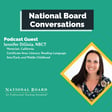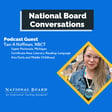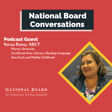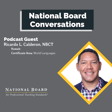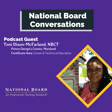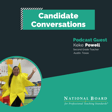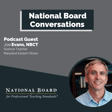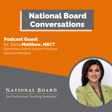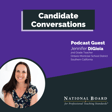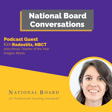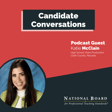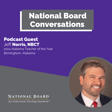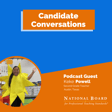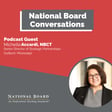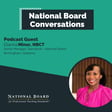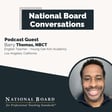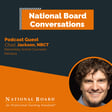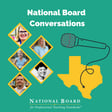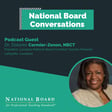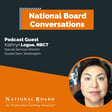Become a Creator today!Start creating today - Share your story with the world!
Start for free
00:00:00
00:00:01

Jami Fowler-White
In this episode of National Board Conversations, we discuss the National Board Standards with Jami Fowler-White, NBCT. Jami stresses the importance of embodying the National Board standards as an educator. We also find out a little bit about her outside the classroom and what keeps her going.
Be sure to follow us on all our social media platforms to keep up with all National Board related updates.
Twitter: @NBPTS
Instagram: @NBPTS
Facebook: The National Board for Professional Teaching Standards
Transcript
Introduction to Jamie Fowler-White
00:00:02
Speaker
Hi, everyone. Eddie Santiago here on this episode of National Board Conversations. We take a dive into the National Board Standards with Jamie Fowler-White. She's a National Board Certified Teacher in Memphis, Tennessee, and an amazing storyteller. So without further hesitation, here's my conversation with Jamie Fowler-White. All right. So welcome, Jamie Fowler-White. How are you doing today? Good morning. I'm doing all right. How about yourself?
00:00:23
Speaker
Pretty well, a little bit of a crazy time here at the National Board right now, but you know, we're excited about, excited to talk to you. My friend Lisa here at the National Board talks about you a lot. And so I'm excited to finally meet you and excited to talk to you. And you as well. I'm so excited to be here with you. All right, so we'll kick it off
Jamie's Career Journey
00:00:42
Speaker
real early. Could you just give us a little bit of an introduction of yourself, your role, your current job, and know what you do? Well, this is my 24th year in education.
00:00:51
Speaker
My first year is, I've corned myself as a pandemic principal. So it's my first year as a principal. Before becoming a principal, I spent three years as an assistant principal, 10 years as an instructional coach, and 10 years in the classroom. Oh, man, you done about everything. Yes.
From Nursing to Education
00:01:14
Speaker
So other than that, I write books for educators, helping them
00:01:21
Speaker
to use reflection as a means of improving instructional practice. And I speak to educators around the world for that. It's awesome. I mean, reflection is a big deal at the national board. We love it. Absolutely. That is where I got my start, reflecting. So can you share why you became a teacher? Oh, accidental. So I'm the accidental teacher. I actually was going into nursing.
00:01:52
Speaker
I had gotten all of my foundational prerequisite classes done. And I had just gotten my letter to say that I had gotten into the Baptist School of Nursing in Tennessee and figured out the college thing. You know, I was taking, still taking that eight to three day. Like I was in high school. It took me like three years figure that out.
00:02:17
Speaker
Like, why are you scheduling all these classes at eight o'clock in the morning? Like, y'all have to do that. Yeah. And so I had scheduled all my classes on Monday, Wednesday, and Friday. So I had Tuesday and Thursday off. And my sister was like, what are you going to do on Tuesday and Thursday? And I was like, sleep. I'm asleep. Yeah. So I'm going to, she was like, well, you know, we are having the hardest time finding substitute teachers.
00:02:41
Speaker
So my sister had just taken a job as a third grade teacher in one of our local elementary schools. And she was like, you really should consider coming in a couple of days a week just to sub. And I was like, I don't know if I want to do that. But I had visited and loved her school. They had such a family atmosphere that when you walk in, you just felt like you were at home. So I gave it a try.
00:03:10
Speaker
fell in love with the children, couldn't wait for Tuesdays and Thursdays to come. I was there every Tuesday and Thursday, became one of the regular substitutes that they had. And after a couple of months, I kind of, I went and sat down with my parents and I was like, so I think I want to change my major. And they were like, no, you almost done. You have like a year. And I was like, yeah, yeah, I don't think I want to do that anymore though.
Importance of Mentorship in Teaching
00:03:39
Speaker
I think I want to teach. Um, and so I was like, um, you know, there are three girls in my family and at one point all of us were in college. And so I talked to my dad and I was like, I only have a year left on my scholarship, but it's going to take me three semesters to complete these classes. I don't know how I'm going to pay for it, but I'm going to get it done. And he was like, don't worry about it. Just go ahead and get it done. And so, um,
00:04:08
Speaker
I took like the maximum amount of hours. I took like 21 semester, 24 another semester and had gotten down to where I only had like that. The semester where you have to do that, the clinical hours to actually get your degree. And I was like, man, I don't know how I'm going to pay for this.
00:04:28
Speaker
But I had been volunteering in one of the offices on campus. And what I did know was happening was that the lady in the office was advocating for them to extend my scholarship for a semester. And so I got this random letter in the mail that said, hey, we're extending your scholarship for a semester. I was like, where is this guy? I didn't know that was a thing.
00:04:55
Speaker
And she came up to me, she was like, did you get your letter? And I was like, I got this weird letter that said that they were extending my scholarship for an additional semester. Like, I didn't know you could do that. She was like, yeah, I know. But I went and talked to them. Because you're almost done. And this is what you were meant to do. And so thanks to her, oh my god, Miss Benita Lyons, I actually became a teacher. Absolutely loved it.
00:05:25
Speaker
The beauty was that some of the children that were in the room, the first day that I was a substitute, became my new students. So it was really awesome. Oh, man, that's such a great story. Yes, yes, it was. Yes, I tell people about the importance of building relationships, because had I been one of those mean, terrible substitutes,
00:05:53
Speaker
Like what kind of first year would I have had, first day would I have had all the job with those students? So yeah. And so they all ran up to me and were excited that I was their new teacher.
Achieving National Board Certification
00:06:07
Speaker
So did you know about a board certification prior to becoming an NBCT? I didn't. But my sister took me to a intercession my first year.
00:06:20
Speaker
And I was so upset, I remember when I left, I was so upset because I said, you had to be in education for three years. And it was my first year. But from the day after I went to this session, I began working towards, I said, oh, this is what I'm gonna do. And at the time there were like less than 300 national board teachers in our state.
00:06:43
Speaker
And I said, I'm going to do that. That's what I'm going to be. And I worked for it. It took me exactly at exactly the 10th year mark. I actually, I made it. The first year I was a little disappointed. I missed by like 2,500th of a point. And I remember having like a mentor and she had read every entry except for the very last one. I was like, oh my God, you don't have to read now. You don't have to read.
00:07:12
Speaker
And that was the one that I didn't make the mark on. And I called her and I said, I got my life together. It was devastating because I had been working for 10 years for it. And I said, well, I'm going to try again. I said, you don't really get information about why you don't make it. But when I read the entry, I knew. I said, I didn't answer the questions. That's what it was.
00:07:41
Speaker
I said, um, and after I make it, um, from then on, I'll make sure that I mentor anyone in the world who asks because, um, I don't want anyone else to, uh, to not make it based on the fact that you don't really understand the process. Um, and so once I made it in 2000 and 2008 and 2009, I started mentoring, uh, national board candidates, anyone.
00:08:10
Speaker
within my district, anyone that emailed me just to help. And they were like, you don't have time to do that. I said, I have time to do it because you need it. It's so important to have a mentor. And I didn't understand it until, and I tell them about like my story. I said, I didn't understand the importance of having a mentor until I didn't use my mentor in the way that I was supposed to. So I've been doing that
00:08:40
Speaker
Even now, I'm still mentoring people because I know how important it is. And they all better for it. I hope so.
00:08:51
Speaker
What were some of your initial thoughts when you dug into the standards of National Board? Like you jumped on them early. Like you said, first year I was ready to go. Well, so because I was just starting out and still getting my my my my footing into education, I use that as well. This is what the best teacher is supposed to do. And so for me, it was like my roadmap and gave me all those stair steps.
00:09:21
Speaker
And so from day one, my goal was to be an accomplished teacher. And so every standard I read, every aspect of it, every expectation, that's what I said that that is the goal that I'm shooting for. This is what I'm supposed to be doing. And so I don't know what kind of teacher I would have been without it. So I think every teacher, even if they're not seeking national board certification,
00:09:51
Speaker
should actually read what an accomplished teacher should do and shoot for that because that means you'll be given the best that you can to every child. What role do the national board standards play while going through the process? Oh the standards especially like the core propositions like they tell you exactly what you're supposed to be doing.
Understanding Students to Enhance Teaching
00:10:16
Speaker
like to know your students, every aspect of your students. So look at them for their individual strengths, the circumstances that they live in. You're supposed to use their interests, like everything about them. You need to get to know them because you're merging all of their experiences with the content that you're teaching. And so if you don't have those relationships with them,
00:10:45
Speaker
You don't know about your data. You don't study your craft. When you stand in front of children, are you really giving them like the best that you can? And so every day you should give 110%. And I just think that everyone, it should be like a class that's required for all teachers, even just the introduction to it. So that we know how, just how important it is
00:11:14
Speaker
when we're building the future of our world. And if we're not at our best, giving our best, doing our best, then what will our future look like? What did you learn about your students or your teaching practice by engaging in the standards? What did you learn about yourself? That is a really good question, let's see. About my students.
00:11:43
Speaker
I had to really dig into what their lives were like outside of the classroom. My last year, the year that I certified, I actually, it was my first year teaching at my old elementary school. And so I went back. It's in the heart of Orange Mound, you know, the oldest African-American community in the United States.
00:12:11
Speaker
They live a hard life, like school was the most stable environment that they had. I remember I had one student, he had siblings, he was the oldest and he had like six siblings of under him. And he would just get into trouble like continuously because he was taking things, stealing. And I would ask him like, why are you doing that? He was like,
00:12:38
Speaker
Well, I'm the oldest and they depend on me. And if I don't take some things, we're not gonna eat. And you know, like stories like that just kind of break your heart. I just remember giving him food. I was like, you don't have to steal. If you need something, just let me know. I'll give it to you. I don't want you stealing. I want you in school because he would be missing like for days. And I was like, I need you in school. And I just remember like that bond
00:13:05
Speaker
Like he hadn't really learned to read well. I was teaching fourth grade and he started asking if he could stay after school. And I remember I was tutoring him so that he was like, I really want to do better, Ms. White. And I was like, I'm going to help you. And so from then on, I would stay like an extra hour after school. Because of him, I started doing like homework. I did a homework hour and told the parents,
00:13:33
Speaker
You know, you could just pick them up an hour late and I'll help them with their homework. Because you may not understand how to do the things and I want them to do my homework. So instead of picking them up, about 3.30, pick them up at 4.30. And we're just doing homework in the room. And that way, when they go home with you, you have doing things, they can do the chores and do whatever they want. Because like they didn't have it. And that was like his refuge. And he actually went on and left and stayed in school.
00:14:03
Speaker
I wonder if he had a different teacher that year if he really would have actually continued. I don't know if any teacher would have really taken the time to get to know him because I don't think they had before then. They just saw him as this disruptive child that came to school sometimes that didn't do any work and did anything he could to go to the office every day because he didn't want people to know he can read. So I think
00:14:32
Speaker
That's the difference that we make. And because I was working, and I had been working for 10 years, it just became like an automatic thing that I would do for any child that I met to make sure that I knew them like as a person individually. And then I could use that and infuse that into everything we did in the classroom.
00:15:00
Speaker
Your story is over here pulling at my emotional heartstrings over here. Oh man. What advice and tips do you have for educators getting into the standards and starting their journey on national board certification?
Advice on Mentorship and Certification
00:15:15
Speaker
Truthfully find a mentor. It's one of the hardest processes because you feel alone. I remember when I did it, I got like this box in the mail with all this stuff and I was like, what am I supposed to do with this?
00:15:31
Speaker
supposed to do. And now you get like a login and it has like all this information and you're like where do I start? Like it's so much like what am I supposed to be doing? So I would say to either get a mentor or seek out someone who actually has gone through the process just because you need a support system not because you can't do it on your own.
00:15:58
Speaker
figuring out which area to certify in was one of the hardest for me. I didn't want to be boxed in, but being a generalist, so my middle childhood generalist was one of the hardest, it's one of the hardest certifications I've ever had. I had to prove that I was an accomplished teacher.
00:16:21
Speaker
for any grade level between the ages of seven and 12. So there's like second grade all the way through middle school. And I remember going through my school going, I need all these teacher editions so I can read all this stuff that I've never taught before so that I can have some type of context. And I did, I had my husband bring in books. I said, I need you to bring all your middle school books home so I can read them. And he was like, what?
00:16:49
Speaker
I said, as I need to notice this content, if I'm gonna be specializing in these, this age group, like I feel like I need to study and know all this stuff, but it changes your mindset. And from then on, you're just as reflective as you want to be. You never depend on other people to tell you what you need to improve. It's just an innate thing in you and you automatically do it.
00:17:21
Speaker
And so a support, even if it's not a mentor, just a support system. And take it one step at a time. Know that it's a process, so you may not get it the first time. Let me see. And never give up on your dream, because you can do it. I think that would be the best advice, maybe.
00:17:47
Speaker
Yeah, one thing we've heard is do it little by little. You're not trying to do it all at once. It'll take you down. It will. It literally will. And it's not meant to be one and done. And so that's the hardest part because for any goal that we've ever had is, oh, I must achieve it the first time. That's what we teach people. But truly, it's a process where you're supposed to learn from your mistakes. So it's really the quintessential
00:18:17
Speaker
uh, part of education. Um, every time you don't make something or you don't meet that expectation, you're supposed to reflect on what could I have done better? Uh, what will I do better the next time? And that's the one thing that it truly taught me about education is that, um, I'm supposed to learn from, um, and reflect.
00:18:45
Speaker
So that's really good. Do you think it's necessary to address all the standards in the components? In all the components? As many as you can, yes. Because you'll catch every child. If you skip any of them that you can. So just think about if you don't know your content but you know your children, then you're just in there having a conversation but you're really not
00:19:15
Speaker
giving them what they need. If you don't know the data behind your children, if I hadn't gone back to look and see that that student who said, oh, please, can you help me learn to read? If I hadn't looked at his data to see which skills he had mastered, would I have been able to take him as fast as I could for him to see whether he's making that progress? And so when you,
00:19:44
Speaker
Think about your parents and your community and collaborating with your colleagues. You have to do them all. If you don't do them all, you're missing an important piece of the puzzle. And so you don't want to not to do them all. And I don't even know if I could at this point in my career not to do them all. Even as a leader, I still see myself in that coaching role, that supporting role.
00:20:14
Speaker
to try to make every teacher use these standards, although they don't know that that's what they don't.
00:20:21
Speaker
When you think about any literature that you read, it's already in there. They just don't actually give National Board the credit for coming up with these concepts. They just gave it a whole other name, but it's really, that's what it is. So we got a couple of questions for you that are off the behalf.
Jamie's Personal Interests
00:20:40
Speaker
So here we go to take us off the behalf and get to know you a little bit more personally outside of education. What kind of music was on your last playlist? Oh, gospel.
00:20:51
Speaker
Oh, I'm literally this week is the second month of my pandemic principle ship. Oh, my goodness. So I have this gospel playlist that I play continuously. It depends on the day, which song I start with. But I listen to a family man, Kirk Franklin.
00:21:18
Speaker
London Adams, Ty Tribbitt, like you name it. Yes, I do. Because I never would have made it. Sometimes as at one, you had to play some more. Yes. So, so usually, lately, that is, that is what I've been playing. That and some instrumental R&B.
00:21:45
Speaker
I've been infusing into my lunchtime music for my students. I'll play a popular song, the instrumental version, and then I'll put a multiplication pack in there. There's a multiplication rack in there so that they don't know that they're learning while they're dancing during lunch. But yeah, gospel, definitely gospel. Because I need it. I need it right now.
00:22:14
Speaker
All right, so what is your favorite kind of food? Oh, I just love food in general. It just changes my whole world around my favorite food. Which meal? Oh my goodness. I literally love food. Favorite breakfast. What's your favorite breakfast food? Oh, my favorite breakfast food. Oh, I love a big breakfast. So I like bacon, eggs, pancakes, and waffles. That's actually what I had.
00:22:42
Speaker
couple of days ago, my first day here in Lake Hamilton, I owe it a cracker barrel. Yes, it was the best day ever. All right, last one, last one, and then we'll get out of here.
Conclusion and Appreciation
00:22:54
Speaker
What hobbies outside of education do you have? Hobbies. I write. It's my self-care. And it doesn't even matter. I have a blog where
00:23:10
Speaker
I literally just sit down and write. I used to color. It's kind of soothing. Like when I was color by number apps, I used to do that one for recolor. I do puzzles because I think puzzles are like life. I just take it one piece at a time. And before you know it, you know, you put the whole thing together.
00:23:36
Speaker
So puzzles are my go-to. Let's see, other than that vacationing, I love it. I think that everyone should take a trip as often as you possibly can. It relaxes you and takes your mind off the world. So I was going to do my podcast outside, but my sisters stole the upper deck and they're very loud.
00:24:03
Speaker
where I could see Lake Hamilton behind me. Yeah, but yes, I think those are my four biggest hobbies. Awesome, awesome. Well, this was great. I'm glad we got to talk. I got to know so much about you. I had to hear some of your story of why you became a teacher, which this whole conversation has been kind of emotional and you got me over and over. But this was awesome. I'm happy to have talked to you.
00:24:31
Speaker
Thank you again for your time and hopefully do this again. Oh, absolutely. I really enjoyed it. What a great and useful conversation with Jamie. I just want to thank her again for taking the time to chat with me and thank you for listening to National Board Conversations. Be sure to follow us on social media to keep up with all the National Board updates. Hit that subscribe button on your podcast platform for choice and we'll see you next time.
